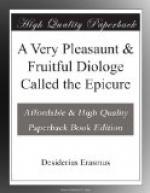wee see, nothyng reioyseth the angry man more, the
too bee reuenged on his offenders, but that pleasure
is turned into pain after his rage bee past, and anger
subdued. Spu. I say not the contrary. He.
Finally, suche leude pleasures bee taken of fallible
thinges, therefore || it foloweth that they be but
delusios and shadowes. What woulde you say furthermore,
if you saw a ma so deceaued with sorcerie & also other
detestable witchecraftes, eat, drynke, leap, laugh,
yea, and clappe handes for ioye, when ther wer no
such thyng there in very dede, as he beleueth he seeth.
Spu. I wolde say he were both mad and miserable.
Hedo. I my self haue been often in place, where
the lyke thyng hath been doone. There was a priest
whiche knewe perfectly by longe experience and practise,
the arte to make thynges seme that they were not,
otherwise called, deceptio visus. Sp.
He did not lerne that arte of the holy scripture?
Hedo. Yea, || rather of most popeholy charmes
and witchecraftes: that is too saye, of thinges,
cursed, dampnable, and wourthy too bee abhorred.
Certayne ladies & gentlewomen of the courte, spake
vnto hym oftentimes: saiyng, they woulde coo[m]
one day too his house and see what good chere he kept:
reprouyng, greatly vile and homly fare, and moderate
expenses in all thynges. He graunted they shulde
bee welcome, and very instauntly desired them.
And they came fastyng because they would haue better
appetites. Wha they wer set to dyner (as it was
thought) ther wated noo kynde of delitious meat:
they filled the selues haboudantly: after ye
feast was || doone, they gaue moost hearty thanckes,
for their galaunte cheare, and departed, euery one
of them vnto their owne lodgynges: but anone
their stomackes beganne too waxe an hungred, they
maruayled what this shuld meane, so soone to be an
hungred and a thirste, after so sumptuous a feast:
at the last the matter was openly knowen and laught
at. _Spu._ Not without a cause, it had been muche
better for the too haue satisfied their stomackes
at their owne chabers with a messe of potage, the
too be fed so delitiousli with vain illusios. _H._
And as I thik ye comune sort of men ar muche more too
bee laught at, whiche in steede of Godlye thynges,
||chose vaine and transitory shadowes, and reioyce
excedyngly in suche folishe phansies that turne not
afterwarde in too a laughter, but into euerlasting
lamentation and sorow. _Spudeus_ The more nerelier
I note your saiynges, the better I like the. _Hedo._
Go too, let vs graunt for a tyme these thynges too
bee called pleasaunt, that in very dede ar not.
Would yow saye that meeth were swete: whiche had
more Aloes myngled with it, then honye? _Spud._ I
woulde not so say and if there were but the third
part of an ounce of Aloes mixt with it. _Hedo._ Or
els, would you wishe to bee scabbed because you haue
some pleasure too scratch? _Spud._ Noo, if I wer ||D.i||
in my right mynd. _HED._ Then weigh with your self




